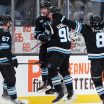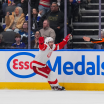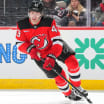"It was a fort: Fort Pitt," Lange said. "If you look down, you can see it bordered by the rivers. I think that is the feeling. 'This is our home. This is our fort.' "
Sports are a way to unite the city and express its spirit. The Penguins are an important part of that.
"I think people here have become very good at celebrating, because they have had a lot of chances to do it and it's been passed down through the generations," said Paul Steigerwald, the Penguins' TV play-by-play announcer, who joined the team in 1980 in marketing. "But this is a special thing, winning the Cup at home.
"First of all, the Cup is the only trophy in sports that is presented to the players. That ritual of seeing the Cup picked up by your player in front of the home fans to me is awesome. This is one of those things that we've waited a long time to see, so it would be really special if they could pull it off."
Only once have Penguins fans seen that ritual in their own rink, when the Penguins lost to the Detroit Red Wings in Game 6 of the Stanley Cup Final at Mellon Arena in 2008. They had to watch Red Wings captain Nicklas Lidstrom take the Cup from NHL Commissioner Gary Bettman and pass it to his teammates. The Penguins avenged that loss at Joe Louis Arena the following year.
They moved from the Igloo across the street to Consol Energy Center a year after that. The building is beautiful, state-of-the-art, with every amenity imaginable. It has an excellent hockey atmosphere. But it hasn't had a signature moment. Yet.


















